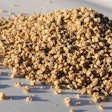Healthy, profitable and disease-free poultry begins with the right pellet, the right nutrition and the right program to reduce risks of food-borne pathogens, according to speakers at the third annual Anitox International Animal Nutrition & Health Symposium held January 28 at the Omni Hotel in Atlanta.
The poultry digestive system is a "complex ecosystem" that requires a balanced state between digestive bacteria, says Dr. Steve Collett, associate professor at the Poultry Diagnostic and Research Center (PDRC), College of Veterinary Medicine at the University of Georgia.
"We've been on top of this with antibiotics," Collett adds. "But now … we need to manage the flora in the cecum (lower intestine) in other ways. We need to create a steady state."
Dr. Collett and Joseph Moritz, professor and state extension specialist at West Virginia University, spoke at the Anitox-sponsored event, a company that specializes in pathogen control in feed and feed ingredients.
"We organized the symposium to facilitate discussions on workable solutions to reduce pathogens on the farm," says Dr. Rick Phillips, DVM, president and CEO of Anitox. "Customers know that we understand their needs, and our strength is technical knowledge, particularly in feed technologies. Given recent and forthcoming changes in regulatory framework, we believe it's important to share knowledge and solutions to help customers reduce risk and improve profitability."
The correct nutrient ratio and absorption are keys to keeping a balanced state in the chicken's gut.




